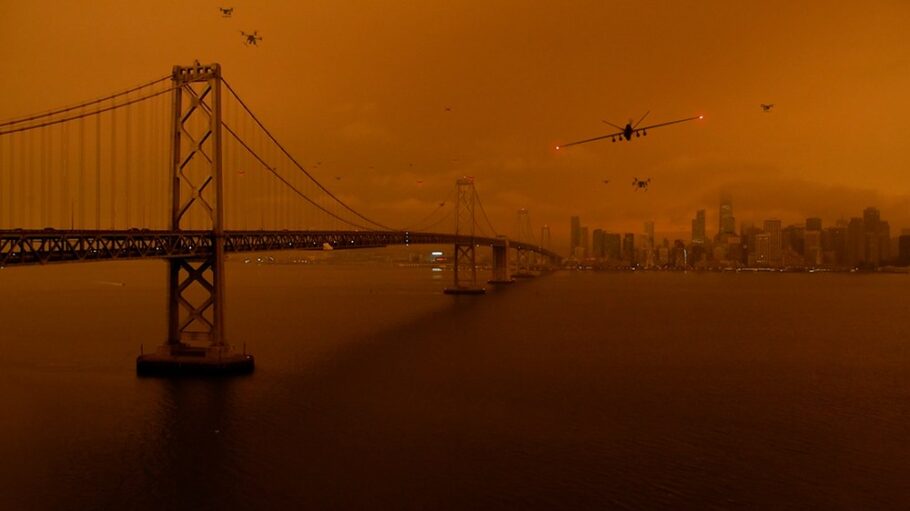Asif Kapadia sees a future vision of the world where “chairwoman” Ivanka Trump is celebrating her 30th year as leader of a nightmarish fascist police state that was once America, a land mostly reduced to rubble following an unknown “catastrophe” that occurred in 2036.
“It’s kind of a joke, but it’s also not a joke,” says the British filmmaker of mentioning Donald Trump’s daughter in “2073,” his chilling docudrama about the dystopia humanity is potentially hurtling towards and the very real and very contemporary factors concerning politics, the environment, corruption, race and technology that he says are propelling us in that direction.
“Because if you look at American politics, you have certain families that just keep being in power — the number of people that have come from a tiny gene pool is insane,” he says.
While the inclusion of Ivanka may be a little splash of humor, the rest of “2073” — which comes backed by Neon, Double Agent and Film4 and is world premiering in Venice on Tuesday — offers little else to be tickled by. The film is what Kapadia says is his response to the world — and the entertainment industry — having got to a “place where people cannot say anything” that criticizes the status quo or those in power without risking losing their jobs or worse.
And so “2073” says a lot, a whole lot. The film essentially lays the blame for the impending disaster — be it nuclear war, climate change or whatever it might be — at the foot of leaders, demagogues, tech billionaires and the 1% and what they’re doing to the planet and society. Alongside the Trumps, there’s the Murdochs, Vladimir Putin, Benjamin Netanyahu, Xi Jinping, Mohammed Bin Salman, Narendra Modi, the Koch brothers, Elon Musk, Mark Zuckerberg, Jeff Bezos, Peter Thiel and many more, spliced alongside news clips and amateur footage from the last couple of decades showing examples of police brutality, rising fascism, the refugee crisis, mass detentions, bombings and wild fires.
Originally the project — which came about during lockdown (Kapadia put out a tweet asking for help and soon gathered a team of researchers from around the world) — was to be a “doc set in the future where everything from the future will be factual and created out of bits of the present.” But he soon decided to use his drama background to mix the two, creating a version of life in 2073 in which Samantha Morton plays a mute survivor besieged by nightmare visions of the past and living underground as surveillance drones patrol the surface.
This past is pieced together using “footage from around 60 different countries, which I made to look like one place,” says Kapadia. Some of footage is extremely recent. In the opening scenes revealing this earth-shattering catastrophe, we see clips of recent devastation in Gaza.
Love Film & TV?
Get your daily dose of everything happening in music, film and TV in Australia and abroad.
“Having been doing this for a while, if you feel like you’re onto something in a horrible way, the world comes into synch with the film,” he says. The war in Gaza, plus the rise of AI and the growing feeling that the next presidential election could be “the end of democracy in the U.S.” all began after he started making the film. “And then a few weeks ago in England we had all these riots.”
“2073” may seem like an unexpected feature from the Oscar-winning documentarian best-known for “Amy,” “Senna” and “Diego Maradona,” but he claims this trilogy of profiles all came about “by accident,” and were each infused with his previous experience in drama and fiction and were each made that way. “’Senna’ is an action movie, ‘Amy’ is a musical, a Bollywood film, and ‘Diego Maradona’ is a gangster film set in Naples,” he says.
But “2073” — an experimental dystopian thriller — still feels like a major key change for the director, a highly provocative and uncomfortable to watch feature with global themes that he hopes will make people realize that “what’s happening over there will get closer and closer and eventually come to you.”
As he notes: “And if you don’t think that’s a problem, then it’s just a movie. But if it is a problem, then you, me, us … we’ve got to do something.”
Kapadia is already among the most outspoken filmmakers on social media when it comes to discussing politics and especially in condemning Israel for the bloodshed in Gaza. While this hasn’t appeared to have hindered his career in the way it has others, he says “2073” — given the topics and the very powerful, very wealthy people it discusses — might.
“I’ve been lucky enough to have made films and in what I do I’ve been successful,” he explains. “So honestly, I went into this going, ‘I’m going to chuck it all in, I’m not going to be afraid to say what I see and if I don’t work again, fine, at least I made this movie.’ ”
From Variety US































